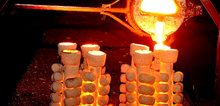Precision casting service is a casting method relative to traditional casting process. It can obtain relatively accurate shapes and high casting accuracy.
The more common practice is: first make an electrode for the required blank (very small or no margin can be left), and then use the electrode to corrode the mold body to form a cavity. Then cast wax by casting to obtain the original wax mold. Brush high-temperature resistant liquid sand on the wax mold layer by layer.
After obtaining sufficient thickness, dry it and heat it again to melt the internal wax mold to obtain a cavity consistent with the required blank.
Then cast molten iron in the cavity, peel off the shell after solidification, and you can get a precision-made finished product
Lost wax casting is now called investment casting, which is a casting process with little or no cutting. It is an excellent process technology in the casting industry and is widely used.
It is not only suitable for casting of various types and alloys, but also produces castings with higher dimensional accuracy and surface quality than other casting methods. Even complex, high-temperature-resistant, and difficult-to-process castings that are difficult to cast by other casting methods can be cast by investment casting.
Investment casting is developed on the basis of ancient wax casting.
As an ancient civilization, China is one of the earliest countries to use this technology. As early as hundreds of years before Christ, the ancient working people of my country created this lost wax casting technology to cast bells, tripods, utensils and other products with various fine patterns and characters, such as the Zenghouyi Tomb Zunpan in the Spring and Autumn Period.
The base of the Zenghouyi Tomb Zun Plate is composed of multiple intertwined dragons, which are connected head to tail and interlaced up and down to form a multi-layer cloud pattern with a hollow middle. These patterns are difficult to produce with ordinary casting technology. However, the lost wax casting technology can take advantage of the characteristics of paraffin wax that is not strong and easy to carve. Ordinary tools can be used to carve out the same paraffin wax crafts as the Zenghouyi Tomb Zun Plate to be obtained. Then, a pouring system is added, and coating, dewaxing, and pouring are added to obtain the exquisite Zenghouyi Tomb Zun Plate.
The modern investment casting method was put into practical use in industrial production in the 1940s. At that time, the development of aviation jet engines required the manufacture of heat-resistant alloy parts such as blades, impellers, and nozzles with complex shapes, precise dimensions, and smooth surfaces.
Because heat-resistant alloy materials are difficult to machine and the parts are complex in shape, so they cannot or are difficult to manufacture by other methods, it is necessary to find a new precision molding process. Therefore, the lost wax casting handed down from ancient times was borrowed. After improving materials and processes, the modern investment casting method has made important developments on the basis of ancient processes.
Therefore, the development of the aviation industry has promoted the application of investment casting, and the continuous improvement and perfection of investment casting has also created favorable conditions for the aviation industry to further improve its performance.
my country began to apply investment casting to industrial production in the 1950s and 1960s.
Since then, this advanced casting process has been greatly developed and has been widely used in manufacturing industries such as aviation, automobiles, machine tools, ships, internal combustion engines, gas turbines, telecommunications equipment, weapons, medical equipment, and knives. It is also used in the manufacture of arts and crafts.
The so-called investment casting process, in simple terms, is to use fusible materials (such as wax or plastic) to make a fusible model (referred to as investment mold or model), apply several layers of special refractory coating on it, dry and harden to form an integral shell, and then use steam or hot water to melt the model from the shell, and then place the shell in a sand box, fill it with dry sand molds around it, and finally put the mold into a roasting furnace for high-temperature roasting (if a high-strength shell is used, the shell can be directly roasted without molding). After the mold or shell is roasted, molten metal is poured into it to obtain a casting.
The dimensional accuracy of investment castings is relatively high, generally up to CT4-6 (sand casting is CT10~13, die casting is CT5~7). Of course, due to the complex process of investment casting, there are many factors that affect the dimensional accuracy of castings, such as the shrinkage of the mold material, the deformation of the mold, the linear change of the shell during heating and cooling, the shrinkage rate of the alloy, and the deformation of the casting during solidification. Therefore, although the dimensional accuracy of ordinary investment castings is relatively high, its consistency still needs to be improved (the dimensional consistency of castings using medium and high temperature wax materials needs to be improved a lot).
When pressing the investment mold, a die with high surface finish of the cavity is used, so the surface finish of the investment mold is also relatively high.
In addition, the shell is made of a refractory coating made of a special high-temperature resistant binder and refractory materials, which is coated on the investment mold, and the inner surface of the cavity that is in direct contact with the molten metal has a high finish.
Therefore, the surface finish of investment castings is higher than that of general castings, generally up to Ra.1.6~3.2μm. The biggest advantage of investment casting is that since investment castings have high dimensional accuracy and surface finish, mechanical processing can be reduced. Only a small amount of machining allowance is required for parts with higher requirements on the parts. Some castings can even be used without machining by leaving only grinding and polishing allowances.
It can be seen that the use of investment casting can save a lot of machine tools and processing time, and greatly save metal raw materials.
Another advantage of investment casting is that it can cast complex castings of various alloys, especially high-temperature alloy castings.
For example, the streamlined outer contour and cooling inner cavity of the blade of a jet engine are almost impossible to form by mechanical processing.
The production of investment casting process can not only achieve batch production and ensure the consistency of castings, but also avoid the stress concentration of residual knife marks after mechanical processing.
The pouring cup is a basic component serving casting technology, especially with the development of the steel industry.
The pouring cup is one of the components of smelting process equipment.
The pouring cup is mainly used to guide the liquid metal into the channel of the cavity. If the pouring cup is not arranged properly, defects such as pores, sand holes, iron beans, slag holes, shrinkage holes, cracks and insufficient pouring may occur in the casting.
Therefore, it is very important to correctly select the structure and size of the pouring cup and arrange it reasonably on the casting.










